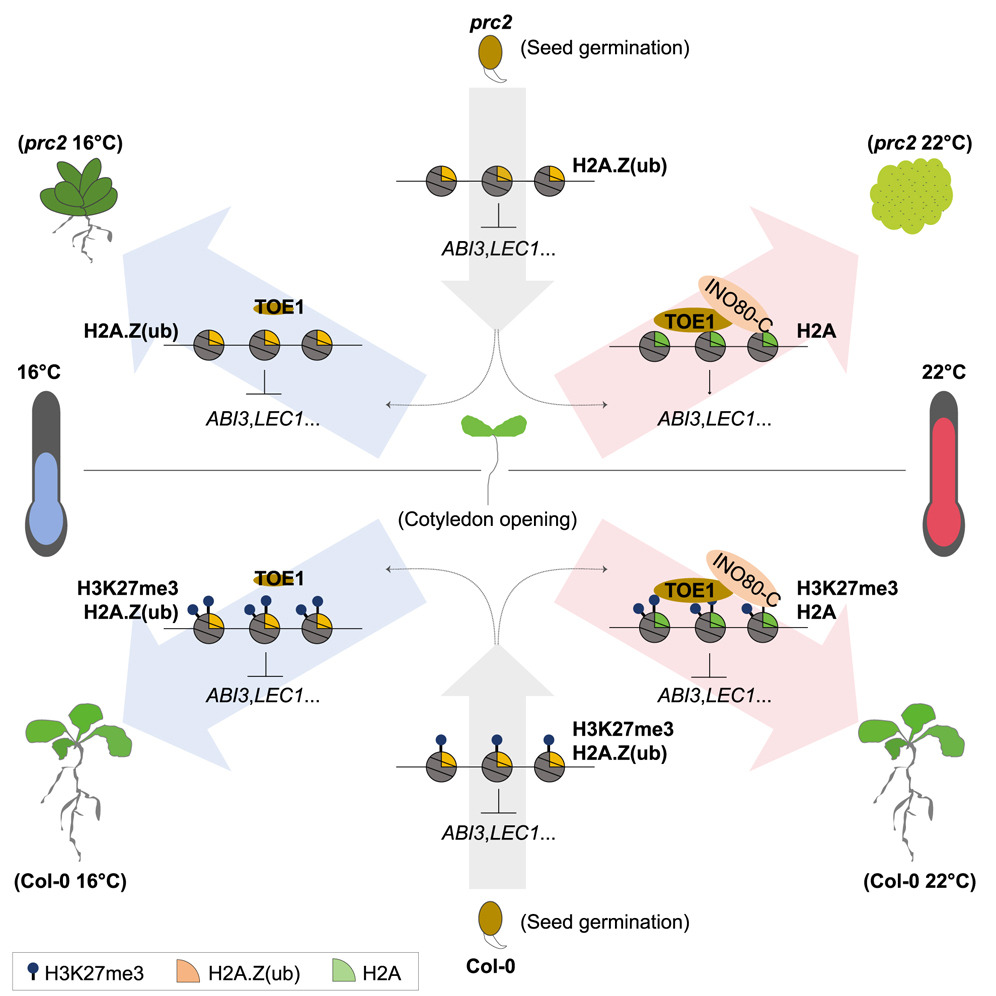2025-04-27 中国科学院(CAS)

The epigenetic regulatory machanisms underlying ambient temperature-dependent determination of plant cell developmental fate (Image by IGDB)
<関連情報>
- https://english.cas.cn/newsroom/research_news/life/202504/t20250427_1042096.shtml
- https://www.sciencedirect.com/science/article/abs/pii/S1534580725002047
シロイヌナズナの細胞運命決定におけるH2A.ZubとH3K27me3の温度による動的制御 Dynamic control of H2A.Zub and H3K27me3 by ambient temperature during cell fate determination in Arabidopsis
Kehui Zhu, Jinchao Chen, Long Zhao, Fangfang Lu, Jia Deng, Xuelei Lin, Chongsheng He, Doris Wagner, Jun Xiao
Developmental Cell Published: April 22, 2025
DOI:https://doi.org/10.1016/j.devcel.2025.04.002
Highlights
- H2A.Z compensates for PRC2 loss at low temperature to control cell fate determination
- H2A.Zub and H3K27me3 coordinately silence seed development program after germination
- Low temperature reduces TOE1 protein levels, slowing H2A.Z turnover
- H2A.Z accumulation represses embryonic genes and lessens PRC2 dependence
Summary
Crucial to plant development, ambient temperature triggers intricate mechanisms enabling adaptive responses to temperature variations. The precise coordination of chromatin modifications in shaping cell developmental fate under diverse temperatures remains elusive. Our study, integrating comprehensive transcriptome, epigenome profiling, and genetics, demonstrates that lower ambient temperature (16°C) partially restores developmental defects caused by H3K27me3 loss in prc2 mutants by specifically depositing H2A.Zub at ectopically expressed embryonic genes in Arabidopsis, such as ABA INSENSITIVE 3 (ABI3) and LEAFY COTYLEDON 1 (LEC1). This deposition leads to downregulation of these genes and compensates for H3K27me3 depletion. Polycomb-repressive complex 1 (PRC1)-catalyzed H2A.Zub and PRC2-catalyzed H3K27me3 play roles in silencing transcription of embryonic genes for post-germination development. Low-temperature-induced reduction of TOE1 protein level decelerates H2A.Z turnover at specific loci, sustaining repression of embryonic genes and alleviating requirement for PRC2-H3K27me3 at post-germination stage. Our findings offer mechanistic insights into the cooperative epigenetic layers, facilitating plant adaptation to varying environmental temperatures.


